Meeting Minutes Policy
The minutes from a Board meeting are the permanent record of that meeting to record when the meeting occurred and what action was taken. Portland Downtown documents full Board meetings, committee meetings, and ad-hoc committee meetings.
Minutes are taken by a member of staff or a team member present at the meeting, are typed/finalized contemporaneously with the meeting, are reviewed and edited by the committee chairs after the meeting and are subsequently approved by the Board.
Any recordings taken for the purpose of facilitating subsequent transcription of meeting minutes are destroyed within 7 days of Board approval of the physically transcribed minutes.
Portland Downtown follows IRS requirements for document retention for 501(c)(4) organizations.
Why are minutes necessary?
Minutes can serve as a necessary legal document, but they are also a practical means of conveying information about what action was taken at a meeting. Minutes may be helpful for recall or for providing information to those who were not present at the meeting, but wish to understand the context, discussion, and/or how decisions were reached.
What should minutes include?
Heading
- Name of the organization / meeting
Introduction
- Date, time and location of meeting
- Whether it was a regular or special meeting
- Board/committee members in attendance, excused, and absent
- Make note of any departures/returns
- Existence of a quorum
- Name of person presiding over the meeting
- Name of any guests present (including staff) (note: this can be an attendance sheet attached to the minutes)
List of Reports by Board and Committee (e.g. committee meeting minutes) (attach reports to minutes rather than describing the contents in the minutes)
General Topics
- Motions made and by whom
- Brief account of any debate against
- Voting results
- Names of abstainers
- Reports and documents introduced
- Future action steps
Resolutions
- Describe the resolution with enough detail to identify it correctly
- Attach full resolution to the minutes
- Record all the same as above in General Topics
Appointments
- Who new committee members, Board Directors are
- The dates on which they joined or were appointed
Closing
- Time meeting ends
- Signature of note-taker
Executive Sessions
The notes of the session, if any, indicate that the board met in executive session, and report on the topic of the discussion, although the specifics (such as the amount of a lawsuit settlement) may be confidential and appear only in a set of confidential-to-the-board notes. A separate recordkeeping system is established for such confidential information, which is better not identified as “minutes” to prevent members and others from asserting the right to view such information. Notes from Executive Session as recorded in the minutes of the board meeting should be as simple and general as “Item X was discussed” (e.g., executive salary and benefits were discussed).
How much detail is too much (or too little)?
The minutes are not a transcript, nor should they try to be a verbatim account of the meeting. They simply are a record of the decisions made and the action taken. When there is a debate or discussion to be recorded, only the major points for and against the issue at hand are included.
It is important for members to have meaningful discussions without being concerned about individual liability; therefore, names or direct quotations should not be recorded in relation to a debate. Names of individuals should be recorded when abstaining from a vote.
Provide enough information so that minutes will be a useful resource. Someone looking at the minutes should be able to understand what decisions were made and the basic reasons why. Skeletal minutes that only include the motions and whether they passed do not provide an adequate record. Records should also include notes that the board deliberated carefully before taking the vote, so that, if necessary, a court would be assured that the board used due diligence in making decisions.
What about recording the meeting?
Recording the meeting can be a useful tool for the note taker for long or involved meetings but it should not replace the written minutes. If the note taker records the meeting, the board should have a written policy of how to deal with them after the minutes are written to protect board members from legal liability. If recordings are to be destroyed, a policy should state so.
What are the legal considerations?
Minutes are a legal record of a meeting. They can be used in court if questions of legal liability around a program or policy arise; therefore, they should be an accurate reflection of what occurred at a meeting and should not raise questions about the legality of actions.
If minutes provide the right information, they can be helpful during a legal review. Any actions or questions around a specific legal issue should be included, with appropriate detail provided. Issues such as a conflict of interest should be noted along with the action that board member took. Individual board members who disagree with a board action and are concerned about personal liability should have their dissent noted in the minutes.

